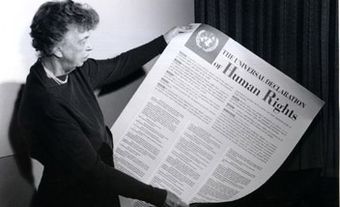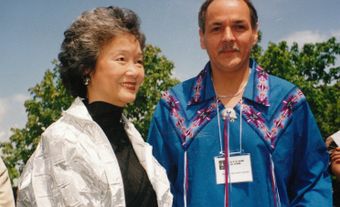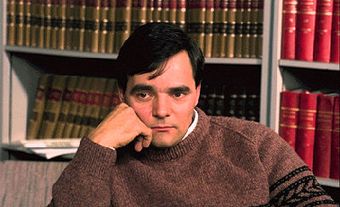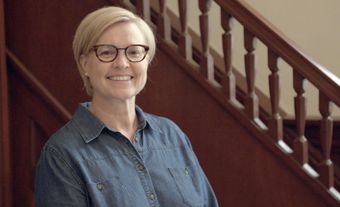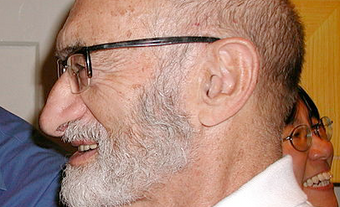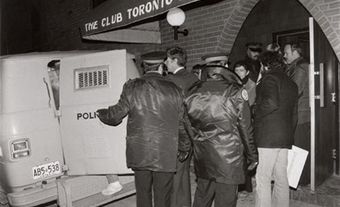Clayton “Clay” Charles Ruby, CM, lawyer, writer, activist (born 6 February 1942 in Toronto, ON; died 2 August 2022 in Toronto). Clayton Ruby was a lawyer, activist and social justice advocate. He specialized in civil rights, criminal law and constitutional law. One of Canada’s best-known defence attorneys, he was an impassioned defender of press freedom and an active member of Canada’s environmental movement. Ruby worked to ensure that all people receive equal access and treatment under Canada’s laws. His more notable clients included the surviving Dionne Quintuplets, Donald Marshall Jr., Guy Paul Morin, Michelle Douglas, Svend Robinson, Dr. Henry Morgentaler and the men charged in the 1981 Toronto Bathhouse Raids.
Early Life
Clayton Ruby was born to Marie Bochner and Louis W. Ruby, a publisher and property developer. His father published a series of tabloids, including Flash, Hush and Midnight. They specialized in gossip at a time when Jewish people were barred from upper-level management in news organizations in Canada. In Ruby’s youth, he attended Toronto’s Holy Blossom Temple. He was lifelong friends with Toronto Star columnist Rick Salutin.
Ruby had initially wanted to be a sociologist. He was considered John R. Seeley’s protege, as Ruby had grown up in the Crestwood Heights neighbourhood and attended one of the schools that took part in Seeley’s Forest Hill Village Project. (The project was the first large-scale sociological study of a suburban community.)
Education
Clayton Ruby earned a Bachelor of Arts from York University in 1963, followed by a Bachelor of Laws from the University of Toronto in 1967. He was called to the bar in 1969. He received his Master of Laws from the University of California, Berkeley in 1973.
While pursuing his Bachelor of Laws in 1965, Ruby attended Harvard University as a summer student. While out one evening with his friend and mentor, John R. Seeley, the pair happened upon a protest that had degenerated into a conflict with the police. When he was told to disperse, Ruby stood his ground and retorted that he had a constitutional right to protest. He was subsequently arrested and brought to jail. He later told a friend that it was at that moment, in the jail cell, that he knew he wanted to spend his career defending people’s civil rights.
Early Career
Early in his career, while still in his 20s, Clayton Ruby was already attracting attention for his passionate defence of those who lacked the means to defend themselves. His earliest clients were street kids in Toronto’s Yorkville neighbourhood. Interviewed by Maclean’s in 1970, Ruby said he was defending the rights of the “so-called ‘radicals’” because he believed what activists were doing in the streets was more important than what he might accomplish in the courts. He was part of a group called “the Diggers.” They provided assistance to young activists, including Canadian hippies and American draft dodgers. He and fellow law student Paul Copeland developed “the Village Bar.” It provided legal advice outside a corner store.
Career Highlights
Ruby was involved in many high-profile cases. He represented Donald Marshall Jr. and exposed the miscarriages of justice that led to Marshall’s 11-year wrongful imprisonment. Ruby also secured Guy Paul Morin’s first acquittal and negotiated a settlement for the surviving Dionne Quintuplets. (They were forcibly removed from the care of their parents and turned into a theme park attraction by the Ontario government.)
Ruby was also a well-respected ally of Canada’s LGBTQ2S+ community, long before it received mainstream acceptance. Ruby defended the men charged in the 1981 Toronto Bathhouse Raids. He also defended the publishers of the Body Politic, an influential gay magazine, when they faced criminal charges. Ruby and his wife, Ontario Superior Court Justice Harriet Sachs, represented Michelle Douglas when she sued the Canadian Armed Forces for wrongful dismissal; this led the Armed Forces to end its discriminatory policies against LGBTQ2s+ people.
Also in the 1980s, Ruby represented Dr. Henry Morgentaler, the physician and abortion rights advocate. Ruby shared Morgentaler’s conviction that women should have full freedom of choice when it comes to pregnancy and abortion, and not be subject to harassment.
Ruby broke ground on other major social justice issues. He represented former NDP member of Parliament Svend Robinson several times, most notably when Robinson attended the medically assisted death of Sue Rodriguez. (See also Assisted Suicide in Canada.)
Other Activities
In addition to his high-profile work as a defence attorney, Clayton Ruby held numerous other positions. His commitment to freedom of expression led him to become the editor of Canadian Rights Reporter. He was also a director of PEN Canada. He was equally recognized for his volunteerism; he supported key organizations and provided them with legal expertise. Among others, he supported PEN Canada, Human Rights Watch, Earthroots and the Sierra Legal Defence Fund (now Ecojustice).
Ruby was also recognized for his published works. He wrote extensively on legal matters, including a textbook for lawyers called Sentencing (10th edition, 2020) and Law Law Law (1971), co-written with Paul Copeland. A prolific writer of letters to the editor, Ruby was eventually given columns in both the Globe and Mail and the Toronto Star.
Ruby’s interest in protecting and preserving the environment led him to become the chair of Earthroots, which is committed to protecting Ontario’s wilderness. He was also an honorary director of the Sierra Legal Defence Fund and a director of the Greenpeace Canada Charitable Foundation.
Ruby also served as the treasurer of the Law Society of Upper Canada (now the Law Society of Ontario), the oldest self-governing professional body in North America.
Personal Life
Ruby was married to Ontario Superior Court Justice Harriet Sachs. They had two daughters together, Emma and Kate.
Honours
Clayton Ruby was made a Member of the Order of Canada in 2005 for being “a champion of human rights and the environment.” He also received the Queen Elizabeth II Diamond Jubilee Medal in 2012. At the time of his retirement, Ruby was the longest sitting bencher at the Law Society of Upper Canada, having practised for more than 50 years. He was seen as a giant in his field, as well as a mentor, a leader, a champion of the underdog and a dedicated advocate for human rights. He died at age 80 due to complications from heart surgery.
See also Civil Liberties; Human Rights; Rights Revolution in Canada.

 Share on Facebook
Share on Facebook Share on X
Share on X Share by Email
Share by Email Share on Google Classroom
Share on Google Classroom

